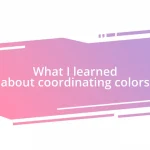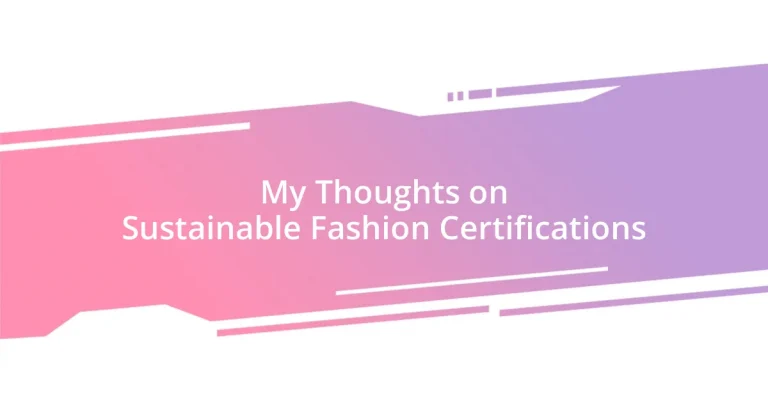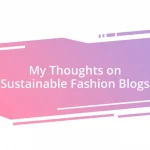Key takeaways:
- Sustainable fashion certifications empower consumers by providing transparency, trust, and alignment with personal values, making shopping a more meaningful experience.
- Key certifications like GOTS, Fair Trade, and OEKO-TEX each focus on specific aspects of sustainability, emphasizing the importance of understanding their distinct criteria.
- The future of certifications may involve more nuanced approaches and technology for better transparency, but consumer education will be essential to avoid confusion from an overload of labels.
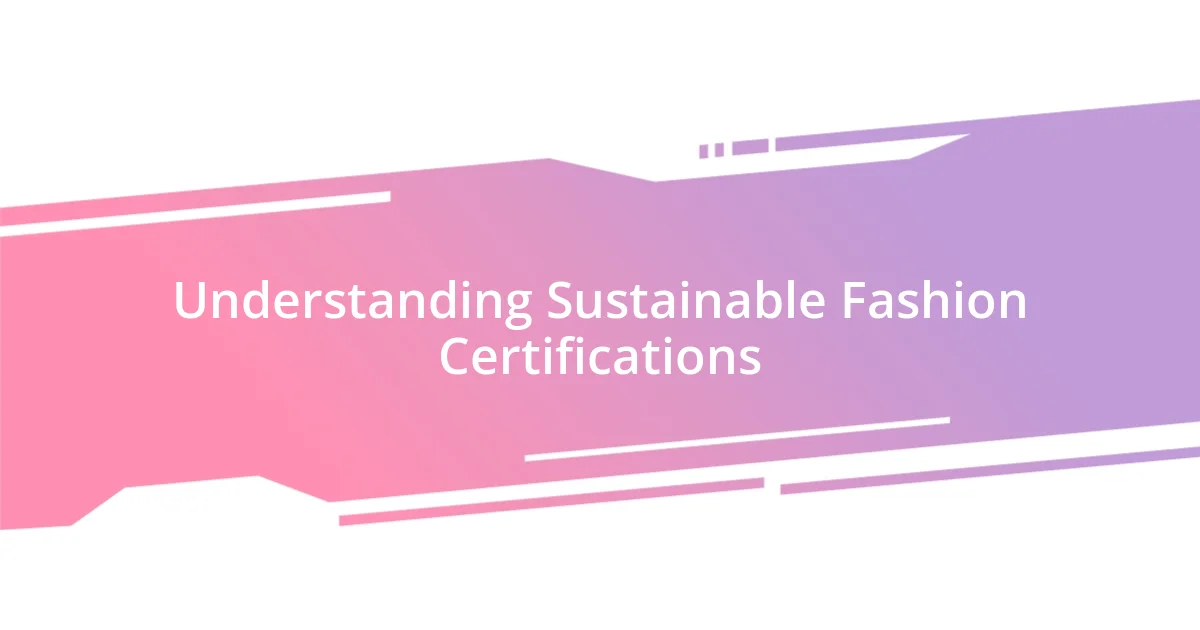
Understanding Sustainable Fashion Certifications
Sustainable fashion certifications might seem a bit overwhelming at first, but they serve as essential guides for conscious consumers. I remember standing in a store, feeling as though I was drowning in labels, each claiming to be more eco-friendly than the last. It made me wonder—how can I truly trust these certifications?
When I started delving deeper into this topic, I was surprised to find so many varying standards and criteria, each reflecting different aspects of sustainability. For instance, some certifications focus on environmental impact, while others emphasize ethical labor practices. It was refreshing yet confusing, and I couldn’t help but think: how can a single label encompass the complexities of ethical fashion?
As I navigated this maze, I realized that understanding these certifications is not just about deciphering labels; it’s about aligning my values with my purchases. Each certification tells a story—of the materials used, the people behind the product, and the practices involved. Have you ever thought about the journey your clothes take before they reach your closet? That’s what these certifications are all about; they offer a peek behind the curtain, allowing us to make better choices for a more sustainable future.
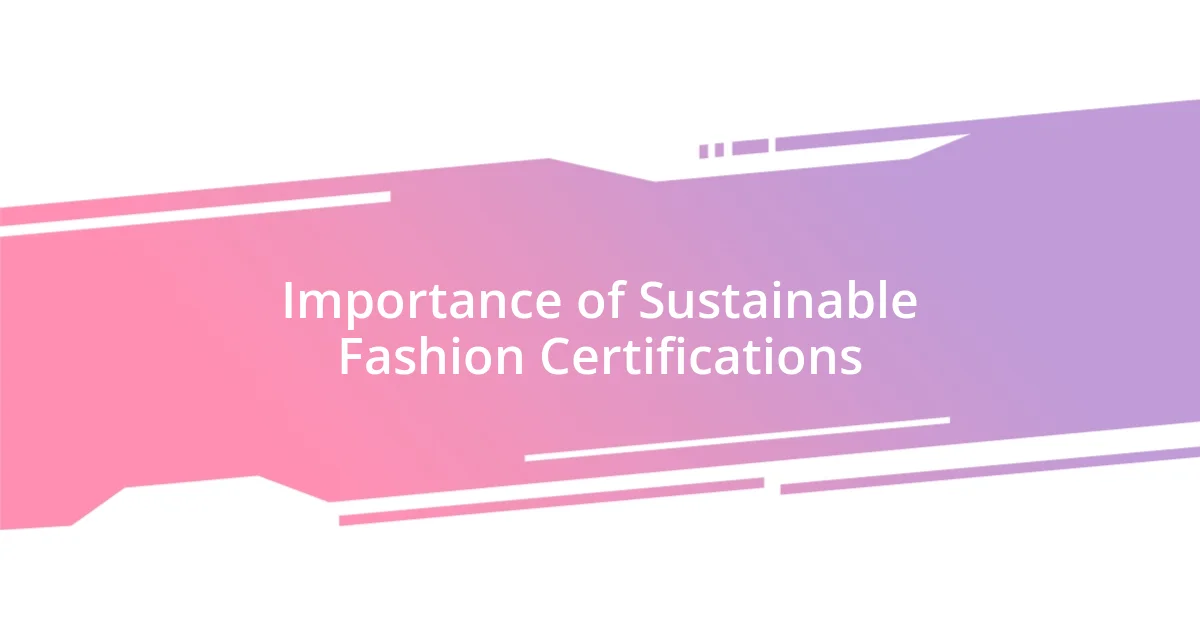
Importance of Sustainable Fashion Certifications
Sustainable fashion certifications play a crucial role in empowering consumers like me to make informed choices. Once, during my quest to find ethical clothing, I stumbled upon a beautiful dress labeled with a well-known certification. That small logo transformed my shopping experience; it signified a commitment to transparency and ethical practices. I recognized that these certifications not only guide purchasing decisions but also hold brands accountable for their impact on the environment and society.
Here are some reasons why these certifications matter:
- Trust and Transparency: They provide a clear framework for assessing a brand’s practices.
- Consumer Education: Certifications educate shoppers about sustainability issues, enabling them to make better choices.
- Brand Accountability: They push companies to adhere to higher standards, ultimately fostering a more sustainable fashion industry.
- Connection to Values: Certifications help align purchases with personal values, making shopping a more meaningful experience.
Navigating the labyrinth of fashion choices can be daunting, but these certifications act as beacons, guiding us toward a more ethical and green wardrobe. Each time I choose a certified brand, I feel a sense of pride knowing I’m contributing to a greater cause.
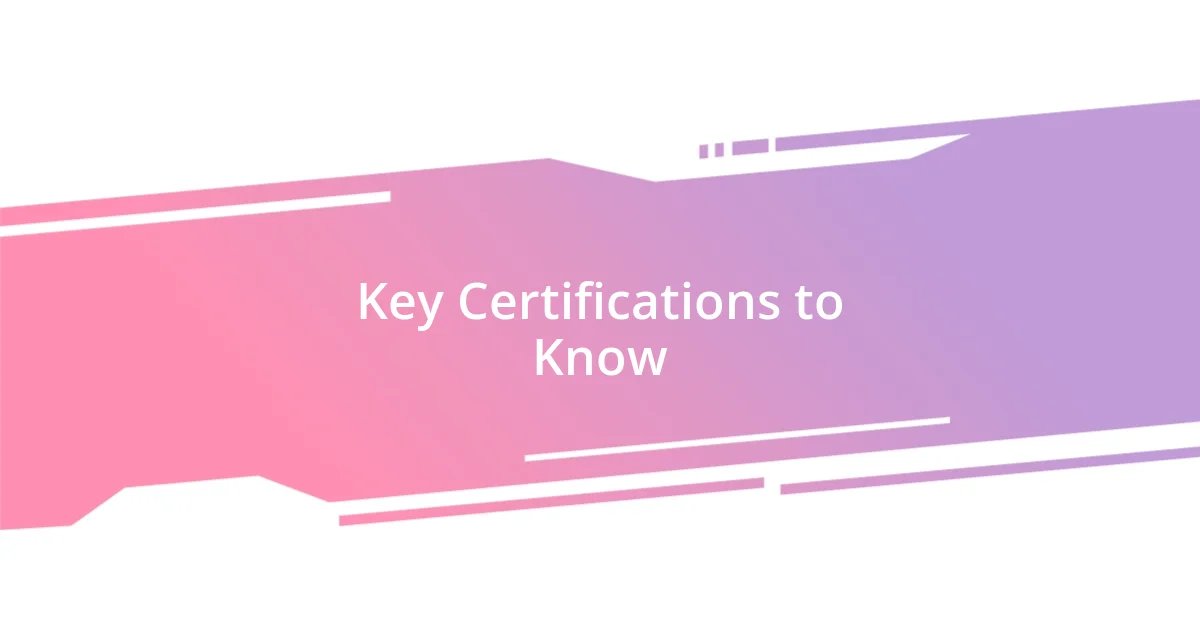
Key Certifications to Know
When exploring sustainable fashion certifications, I found a few key ones that stand out. One that caught my eye is the Global Organic Textile Standard (GOTS). It not only certifies organic fibers but ensures that the entire production process meets rigorous environmental and social criteria. I remember when I first learned about GOTS; it felt like finding a trusted friend in a confusing marketplace. Knowing the cotton in my shirt was grown without harmful chemicals gave me a sense of peace.
Another certification I often see is the Fair Trade label. It represents more than just fair wages—it also emphasizes community development and ethical labor practices. I recall purchasing a Fair Trade handbag and feeling a connection to the artisans behind it. It wasn’t just a fashion choice; it was a commitment to supporting communities. Each time I see that label, it reminds me that my purchase can make a difference.
Lastly, there’s the OEKO-TEX certification, which is equally important. This certification ensures that textiles are free from harmful substances, making it an excellent choice for health-conscious consumers. When I spotted an OEKO-TEX certified baby blanket, I felt relieved knowing it was safe for my niece. These certifications are not just about trends; they resonate on a personal level, shaping our choices and ensuring a brighter, more responsible future for fashion.
| Certification | Focus |
|---|---|
| Global Organic Textile Standard (GOTS) | Organic fibers and sustainable production |
| Fair Trade | Ethical labor practices and community development |
| OEKO-TEX | Textile safety and absence of harmful substances |
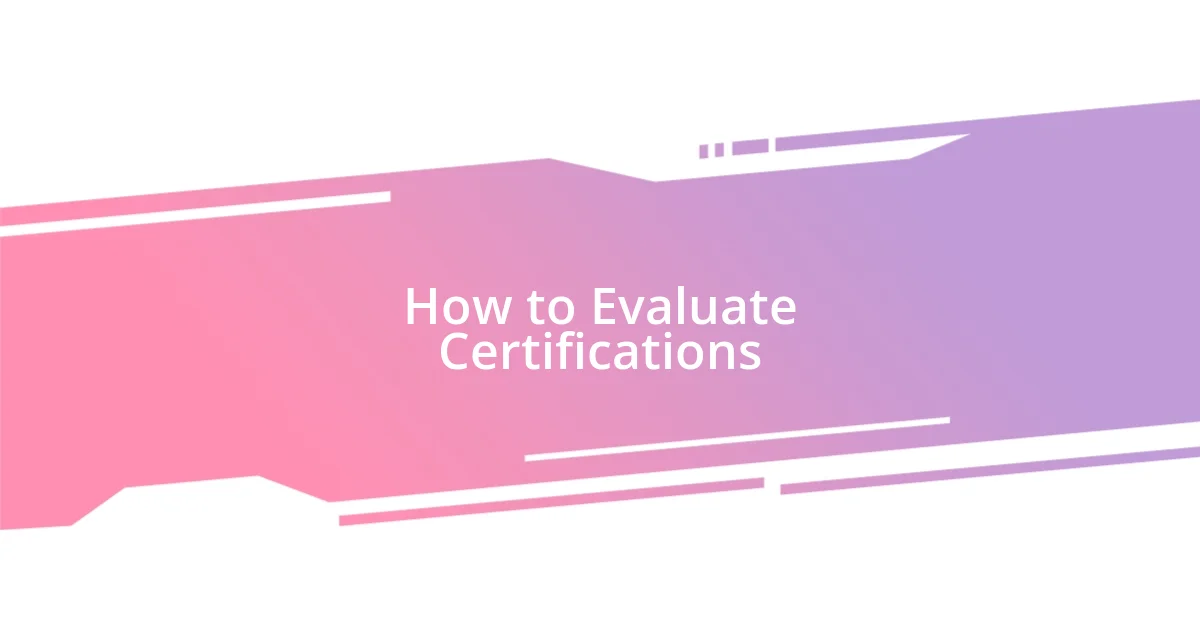
How to Evaluate Certifications
Evaluating sustainable fashion certifications can feel overwhelming, but it becomes easier when you know what to look for. I often start by examining the certification criteria. For instance, does it cover environmental practices, labor rights, or both? I remember feeling a rush of confidence when I found a certification that not only focused on eco-friendliness but also prioritized workers’ rights. It made me feel like my choices were truly making an impact.
Another important factor is the credibility of the certifying body. It’s wise to research the organization behind the certification—are they respected within the industry? If I have any doubts, I simply ask myself: would I trust a certification that hasn’t been scrutinized by experts? Once, I almost purchased a garment with a questionable label, but digging deeper revealed it wasn’t backed by recognized standards. That was a valuable lesson in doing my homework.
Lastly, I pay attention to how transparent the brand is about its certification. A brand that shares detailed information about the certification process gives me peace of mind. I distinctly recall visiting a brand’s website and being impressed by their commitment to transparency. They explained their practices in simple terms, and I felt a genuine connection with their mission. Do you ever wonder if brands are truly dedicated to sustainability, or if they just want to cash in on the trend? Personally, I find that transparency speaks volumes about a brand’s values.
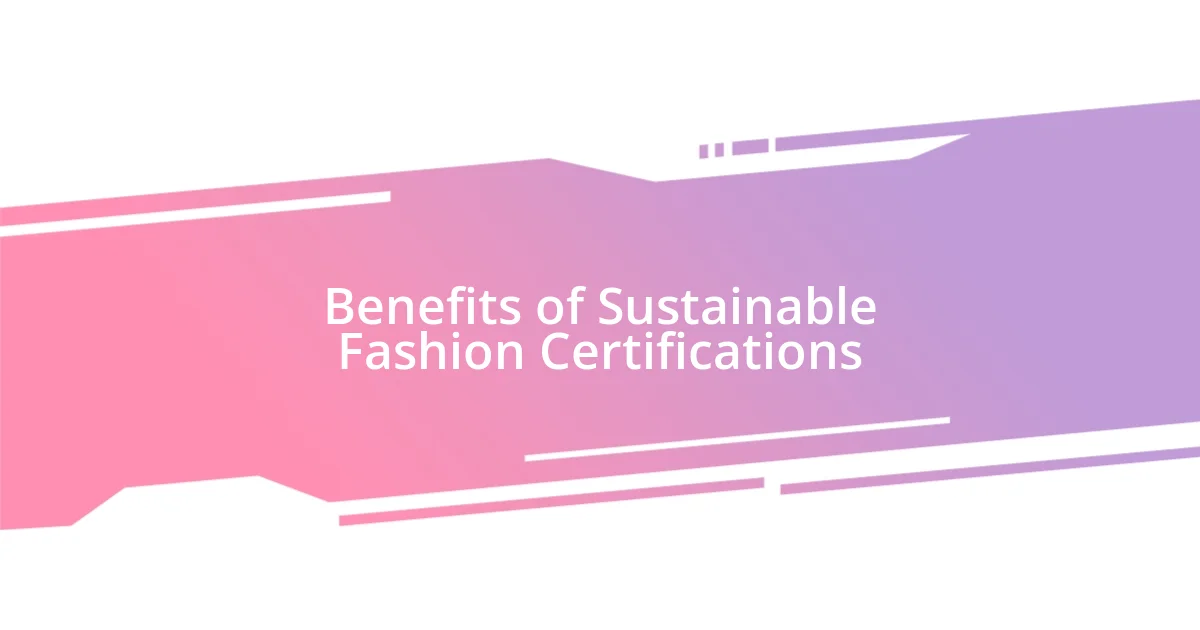
Benefits of Sustainable Fashion Certifications
Sustainable fashion certifications offer a valuable framework for consumers to make informed choices. When I first noticed the GOTS label on my organic cotton dress, there was a newfound appreciation for the garment itself. It wasn’t just about style; it was about the story behind the fabric and the people involved in making it. Isn’t it wonderful to feel aligned with the values of what you wear?
Moreover, these certifications build trust between consumers and brands. I remember feeling skeptical about a trendy clothing line until I saw they were Fair Trade certified. That certification assured me the artisans were treated fairly and understood the value of their work. It transformed my purchase into a conscious choice rather than just another item in my closet.
Lastly, sustainable fashion certifications often inspire brands to improve their practices. I’ve seen smaller labels proudly showcase their OEKO-TEX certification, which encourages them to maintain higher safety standards. As I put on my OEKO-TEX certified sweater, I felt like I was supporting an ongoing journey towards better health and environmental consciousness. It’s clear that these labels empower both consumers and creators to strive for a more sustainable future together.
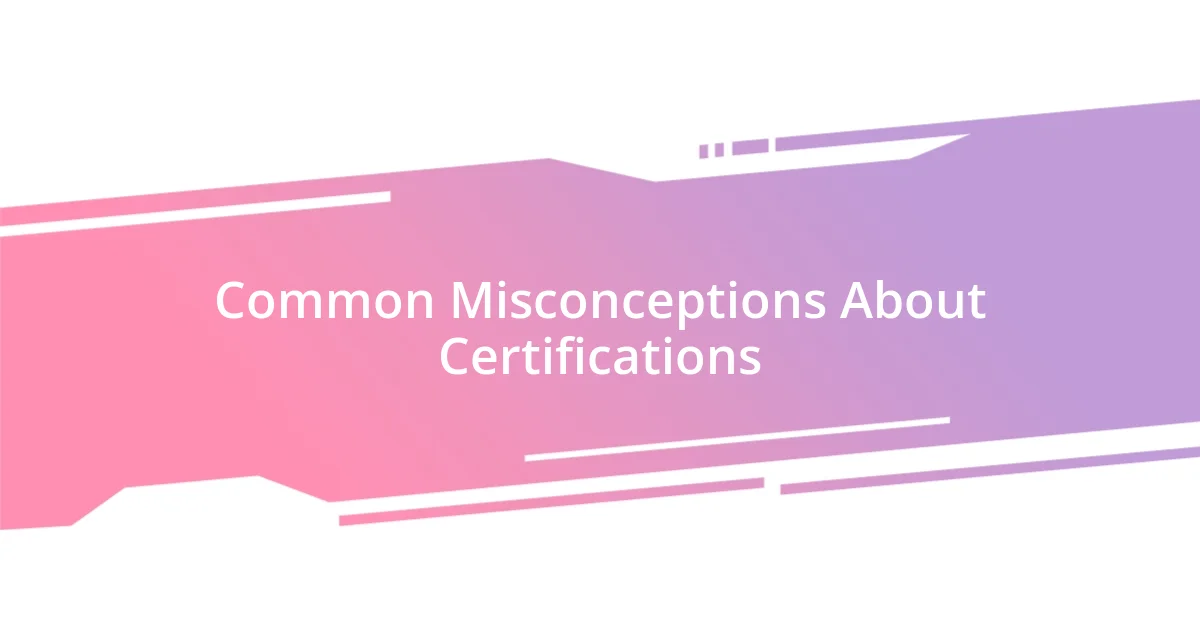
Common Misconceptions About Certifications
Many people believe that all certifications guarantee the same level of sustainability and ethical practices. This couldn’t be further from the truth. I recall a time when a friend excitedly showed me their newly purchased top labeled as “eco-friendly,” but upon closer examination, it turned out the certification was quite basic, focusing solely on one aspect like organic materials. It made me wonder: How can consumers truly gauge commitment without understanding the nuances within these certifications?
Another misconception is that once a brand earns a certification, they can rest easy knowing they’ve done their part. I used to think that way too, until I learned that certifications often require ongoing assessments and adherence to evolving standards. One brand I trusted began slipping in transparency, and before I knew it, they lost their appeal as my go-to choice. How often do we, as consumers, assume that a label ensures long-term sustainability without keeping the brand accountable?
Many might think that sustainable certifications are just marketing gimmicks to capitalize on eco-conscious consumers. I’ve even encountered individuals who scoffed at the whole idea, believing it was too good to be true. However, I’ve witnessed firsthand how some brands genuinely harness these certifications to better their practices. A smaller company I supported began sharing their journey toward certification and showcased their challenges and triumphs, making me feel part of a meaningful narrative rather than just a sale. Isn’t that a more powerful connection to the products we choose?
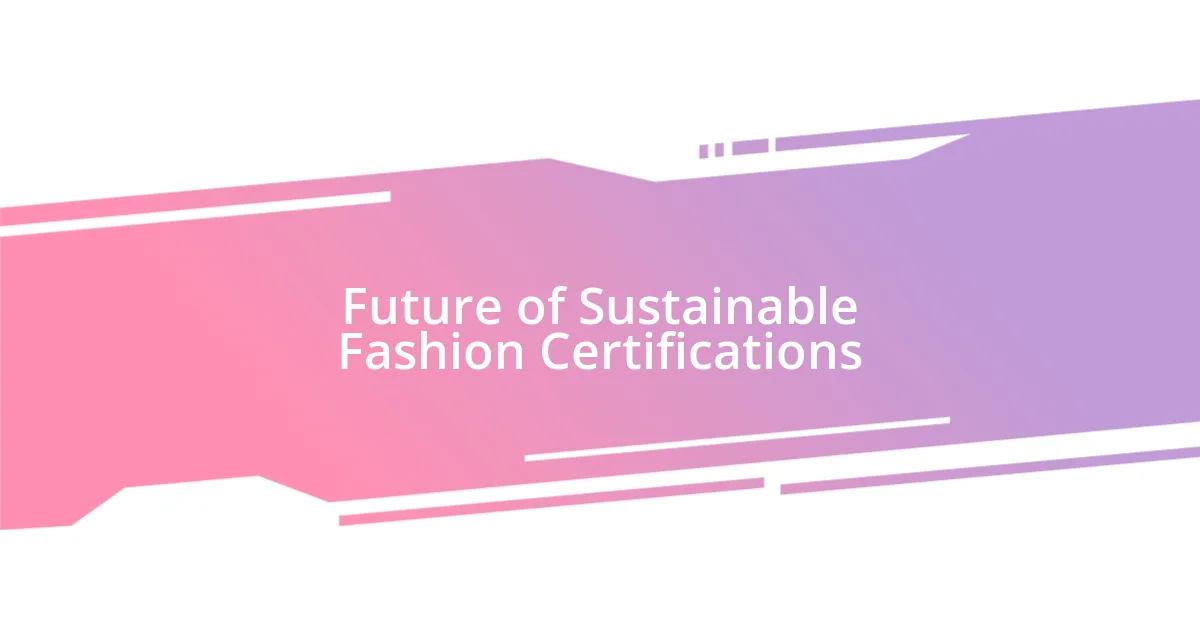
Future of Sustainable Fashion Certifications
The future of sustainable fashion certifications appears promising, yet it is also complex. As awareness increases, I envision more nuanced certifications emerging to address various aspects of sustainability—like water use, waste management, and social impact. Can you imagine a time when we’ll see a comprehensive label that tells the whole story of a garment?
I also believe technology will play a pivotal role. Recently, I came across brands using blockchain technology to verify the supply chain’s integrity and ensure transparency. The idea that I could scan a QR code to learn about each step my clothing took from production to purchase was exciting! Isn’t it empowering to think we could soon have all that information at our fingertips?
However, I worry that as certifications evolve, so too might the challenge of consumer understanding. If we introduce a multitude of labels, will consumers feel overwhelmed or misled again? I remember feeling confused when a friend showed me countless certifications on their new outfit—none of which I was familiar with. It highlights how essential education will be in this journey, ensuring that our choices reflect genuine sustainability rather than mere marketing buzz.










